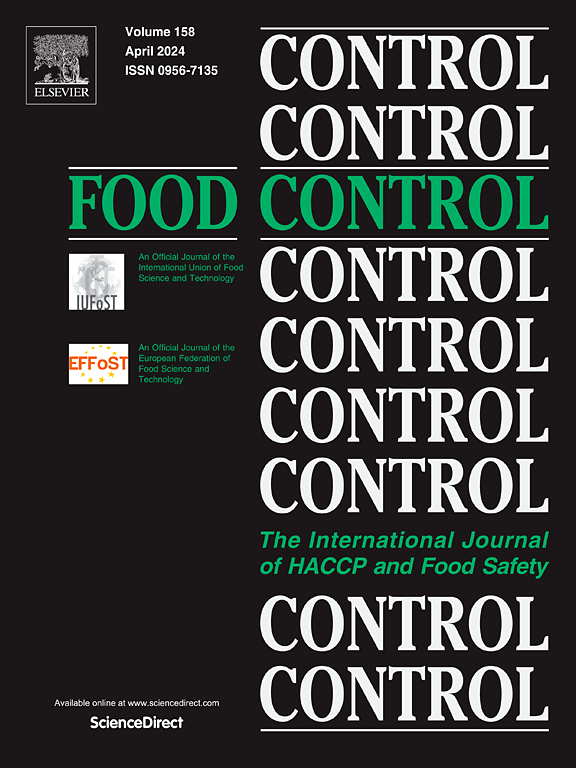基于丁香酚的微乳剂与纳米乳剂的抗菌效果:对提高 Sikhye 食品保质期的评估
IF 5.6
1区 农林科学
Q1 FOOD SCIENCE & TECHNOLOGY
引用次数: 0
摘要
本研究调查了含有丁香酚和米糠油的微乳剂(MEs)和纳米乳剂(NEs)的抗菌特性,以延长韩国传统大米饮料 Sikhye 的保质期。采用琼脂盘扩散法和最低抑菌浓度 (MIC) 试验对这些乳剂进行了评估,以对抗大肠杆菌、蜡样芽孢杆菌和金黄色葡萄球菌。结果表明,与 NE 相比,ME 的抑菌区更大,MIC 值更低,表明其抗菌活性更强。在 Sikhye 中应用这些乳液后发现,丁香酚含量越高、液滴尺寸越大,就越能有效抑制细菌的生长。研究还发现,虽然米糠油有助于提高物理稳定性,但并不能增强抗菌效果,在某些情况下还会促进细菌生长。总之,这些研究结果表明,富含丁香酚的 ME 可作为有效的天然防腐剂,提高 Sikhye 以及其他潜在食品的安全性和保质期。本文章由计算机程序翻译,如有差异,请以英文原文为准。
Antimicrobial effects of eugenol-based micro- vs. nano-emulsions: Evaluation of shelf-life enhancement in Sikhye
This study investigated the antibacterial properties of micro-emulsions (MEs) and nano-emulsions (NEs) containing eugenol and rice bran oil to enhance the shelf life of Sikhye, a traditional Korean rice beverage. The emulsions were evaluated using the agar disk diffusion method and minimum inhibitory concentration (MIC) tests against Escherichia coli, Bacillus cereus, and Staphylococcus aureus. The results demonstrated that MEs exhibited larger inhibition zones and lower MIC values than NEs, indicating superior antibacterial activity. The application of these emulsions in Sikhye revealed that a higher eugenol content and larger droplet size effectively inhibited bacterial growth. The study also found that, while rice bran oil contributed to physical stability, it did not enhance the antimicrobial effect and, in some cases, promoted bacterial growth. Overall, these findings suggest that eugenol-rich MEs could serve as effective natural preservatives, improving the safety and shelf life of Sikhye and potentially other food products.
求助全文
通过发布文献求助,成功后即可免费获取论文全文。
去求助
来源期刊

Food Control
工程技术-食品科技
CiteScore
12.20
自引率
6.70%
发文量
758
审稿时长
33 days
期刊介绍:
Food Control is an international journal that provides essential information for those involved in food safety and process control.
Food Control covers the below areas that relate to food process control or to food safety of human foods:
• Microbial food safety and antimicrobial systems
• Mycotoxins
• Hazard analysis, HACCP and food safety objectives
• Risk assessment, including microbial and chemical hazards
• Quality assurance
• Good manufacturing practices
• Food process systems design and control
• Food Packaging technology and materials in contact with foods
• Rapid methods of analysis and detection, including sensor technology
• Codes of practice, legislation and international harmonization
• Consumer issues
• Education, training and research needs.
The scope of Food Control is comprehensive and includes original research papers, authoritative reviews, short communications, comment articles that report on new developments in food control, and position papers.
 求助内容:
求助内容: 应助结果提醒方式:
应助结果提醒方式:


